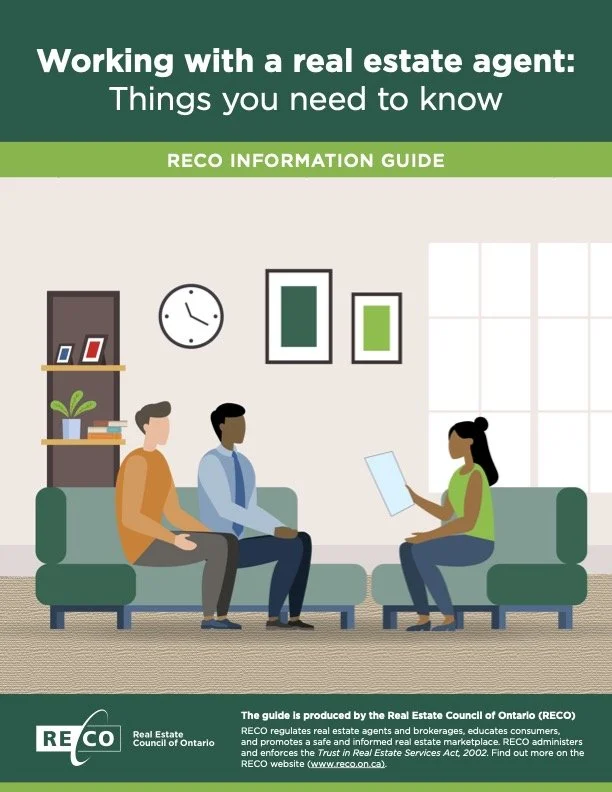BUYERS
Understanding Buyer Real Estate Forms in Ontario
Navigating the home-buying process in Ontario can feel overwhelming, especially when it comes to the paperwork. From making an offer to finalizing the deal, each form plays a crucial role in protecting your interests and ensuring a smooth transaction.
This website is designed to help you understand the key real estate forms used in Ontario, breaking down complex legal documents into clear, easy-to-follow explanations. Whether you're a first-time buyer or a seasoned investor, knowing what you’re signing is essential.
Explore our guides to learn about the Agreement of Purchase & Sale, Buyer Representation Agreement, and other important documents—so you can confidently move forward with your home purchase.
Essential Buyer Real Estate Forms in Ontario
1. RECO Information Guide
The RECO Information Guide, introduced in 2023, is the first document you’ll receive when working with a real estate professional. Mandated by the Real Estate Council of Ontario (RECO)—the consumer protection body for Ontario real estate—it must be provided to any prospective client before any services or advice are given.
This guide helps consumers understand:
The benefits of working with a realtor and the risks of self-representation
The duties and obligations of real estate agents and brokerages
The Representation agreements, including commission details
THE Disclosure rules in multiple-offer situations
THE Other key topics, such as multiple representation and the process for filing a complaint with RECO
2. Defining Your Relationship with a Realtor
After reviewing the RECO Information Guide, you’ll sign one of two documents that establish your working relationship:
2a) Buyer Representation Agreement (BRA) – OREA Form 300
The Buyer Representation Agreement (BRA) is a contract between you (the Buyer) and the real estate brokerage, outlining the terms of your relationship. It details:
The commission payable if you purchase a property
The agent’s role in the transaction
The brokerage’s duties, including confidentiality, negotiation, and full disclosure of material facts
Any geographic or time limitations of the agreement
By signing a BRA, your agent is legally required to:
⚠️ Promote and protect your best interests
⚠️ Negotiate favorable terms on your behalf
⚠️ Maintain confidentiality (e.g., your budget, motivation, and timeline)
⚠️ Take reasonable steps to discover and disclose relevant property details
Understanding the Holdover Period
The holdover clause, as outlined in the RECO Information Guide, extends the agent’s right to commission for a set period after the BRA expires if you purchase a property introduced to you during the agreement. This does not apply to new properties viewed after the contract ends. If you have questions, discuss this with your realtor.
2B) Self-Represented Party (SRP) Acknowledgement Form
Buyers and sellers can choose to represent themselves in a transaction. However, in doing so, a realtor cannot provide services, advice, or opinions—including recommendations on price, terms, or offer clauses. If you opt for self-representation, you’ll need to sign an SRP acknowledgment form, confirming that you understand you are acting entirely on your own.
3. FINTRAC Identification Record
As required by federal law, all real estate transactions must comply with FINTRAC (Financial Transactions and Reports Analysis Centre of Canada) regulations. You’ll need to provide identification as part of the anti-money laundering verification process.
4. Agreement of Purchase & Sale (APS) – OREA Forms 100 & 101
The Agreement of Purchase & Sale (APS) is the most important document in your real estate transaction. Since all Ontario real estate deals must be in writing, this legally binding contract outlines the terms and conditions of your offer.
Form 100: For house purchases
Form 101: For condo purchases
Key Sections of the APS
Buyer & Seller details (legal names)
Property description (lot details, condo corporation information)
Purchase price & deposit terms
Irrevocable time (offer expiration deadline)
Completion date (when ownership transfers)
Inclusions & exclusions (e.g., appliances, fixtures)
Rental items (e.g., hot water tank)
Condo fees & parking details (if applicable)
HST applicability (usually not for resale homes)
Legal instructions for lawyers (title searches, closing procedures)
Attached Schedules
Schedule A: Created by the Buyer’s brokerage, detailing buyer-friendly terms and any conditions (e.g., financing, home inspection).
Schedule B: Created by the Seller’s brokerage, covering items like deposit handling and brokerage liability. Carefully review this section!
Important APS Considerations
⚠️ Time is critical – If an offer expires at 11:59 PM, it cannot be accepted at 12:01 AM.
⚠️ Delivery matters – The accepted APS must be delivered before expiry (often via email).
⚠️ Time zone relevance – The property’s location determines the time zone (not where the Buyer or Seller is).
⚠️ All changes must be initialed – Any handwritten or added terms must be acknowledged by all parties.
⚠️ Brokerages & agents are not parties – The APS is a legal contract between the Buyer and Seller, facilitated by real estate professionals.
5. Confirmation of Cooperation – OREA Form 320
This form defines the commission agreement between the Buyer’s and Seller’s brokerages. It also clarifies:
Whether the Buyer and Seller have their own agents (separate brokerages)
Whether the same brokerage represents both sides (Brokerage Representation)
Whether the same agent represents both parties (Designated Representation / Multiple Representation)
Both brokerages must sign this document to confirm cooperation terms.
Final Thoughts
Real estate paperwork might seem complex, but each form plays a crucial role in protecting your rights and defining your transaction terms. Your agent should walk you through these documents in detail—don’t hesitate to ask questions or request clarification.
Buying a home is a big decision—understanding these forms ensures you make informed choices with confidence!
Let’s work together
Book a FREE consultation to learn more about our BUYING and SELLING strategIES






